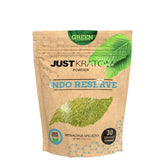The short answer is yes, kratom is legal in most US states. Here are some key points to keep in mind:
- Legal Status: Kratom is not a controlled substance under U.S. federal law, meaning it's generally accessible across the country.
- FDA Position: The FDA maintains that there is insufficient research to ensure the safety of kratom.
- State and Local Restrictions: Despite its federal legality, kratom is illegal in a few states and some localities. The states where kratom is illegal include:
- Alabama
- Arkansas
- Indiana
- Tennessee
- Vermont
- Wisconsin
While you can legally buy and use kratom in most parts of the United States, it's important to check your local regulations to ensure compliance with state and local laws.

What is Kratom?
Kratom is a fascinating plant from Southeast Asia with a rich cultural history. It's becoming pretty popular in the western world, too!
Here's how it works: Kratom interacts with opioid receptors in the brain, giving it its unique effects. At moderate doses, it acts like a stimulant, similar to how many of us enjoy coffee for a boost. In Thailand, people often chew kratom leaves to get this effect.
When taken in higher doses, kratom has powerful sedative and pain-relieving properties, much like opioids. Many appreciate kratom for these opioid-like effects, but it's generally considered easier to access and thought to be safer. While it's important to note that kratom can be addictive, its withdrawal symptoms are typically less severe compared to those of traditional opioids.
In essence, kratom offers a range of benefits, from a gentle pick-me-up to potent pain relief, making it a versatile option for many people. Read more in our Comprehensive Guide to Kratom blog here.

Is Kratom Legal?
Kratom is legal for sale in most US states, which is great news for those interested in trying it. The Food and Drug Administration (FDA) doesn’t regulate kratom under the Controlled Substances Act, so it's up to individual states and local areas to decide on its sale and possession.
While the federal government hasn't banned kratom, there are some important things to keep in mind. The FDA's official stance is that there isn’t enough research to guarantee kratom’s safety. Additionally, there are no approved pharmaceuticals or medicines that contain kratom or its two main active compounds, mitragynine and 7-hydroxymitragynine.
The American Kratom Association is a nonprofit advocacy group that works to preserve consumer access to kratom and promote its safe use. The organization fights against proposed state and federal bans on kratom.
So, while kratom is widely accessible, it's important to stay informed and cautious due to the ongoing research about its safety and effects.

The Drug Enforcement Administration (DEA) considers kratom a Drug and Chemical of Concern. This mainly highlights the fact that there isn’t enough scientific or clinical data to fully understand the risks and benefits of kratom.
Back in 2016, concerns over the lack of research led the government to place an emergency ban on kratom, temporarily classifying it as a Schedule I drug under the Controlled Substances Act. This emergency scheduling meant kratom was immediately classified as having no accepted medical use and a high potential for abuse, for a period of two years. This period can be extended and potentially made permanent if there is sufficient evidence to support a ban.
Interestingly, other Schedule I substances you might be familiar with include marijuana and LSD, both of which have recognized therapeutic benefits despite their official classification. So, while kratom is currently under scrutiny, it's worth noting that the classification doesn’t always reflect the potential medical uses of a substance.

In fact, the backlash against the emergency ban on kratom was so strong that the government quickly reversed its decision.
So, should kratom be legal? That's a tough question to answer without solid data on its effects and safety. But let's dive into what we think we know so far.
Should Kratom Be Legal?
Advocates for kratom legalization often point to the history of psychedelics as a cautionary tale. Back in the day, scientists were exploring the therapeutic potential of psychedelics like LSD and psilocybin. These substances showed great promise in treating physical and psycho-emotional conditions, offering hope to those without viable treatment options.
However, once these substances were banned, research came to a standstill. Despite a recent resurgence in psychedelic research, progress remains slow. The promising new findings highlight the high cost of their 50-year prohibition. Psychedelics are now emerging as powerful, life-changing treatments for people who have exhausted other options.
The concern is that banning kratom outright could lead to a similar missed opportunity. While research on kratom is still ongoing and there's not enough data to make a definitive case either way, many fear repeating the costly mistake made with psychedelics.

From what we know, kratom could be a safer and more accessible alternative to opioids, especially for those dealing with chronic pain. While kratom interacts with opioid receptors, it's not classified with other opioids due to some pharmacological differences.
According to a report from the World Health Organization, kratom is currently considered to have a lower risk potential compared to opioids. One key distinction is that kratom doesn’t seem to pose a risk of respiratory depression, which is a serious complication of opioid overdose that can lead to a lack of oxygen and potentially respiratory or cardiac arrest.
Additionally, kratom can be helpful for those struggling with opioid addiction or withdrawal. However, it’s important to note that kratom itself has a high potential for addiction and can cause severe withdrawal symptoms.
In summary, while kratom shows promise as an alternative to opioids, it's essential to approach it with caution due to its addictive properties.

Is Kratom Safe?
There have been sporadic cases of toxicity and fatalities related to kratom use. However, these incidents are often linked to the combined use of kratom with other substances, highlighting the need for more research on kratom's effects.
In places like Southeast Asia, where kratom has been used culturally for a long time, there are fewer reports of severe side effects and fatalities compared to the West. Researchers suggest a few reasons for this:
- Mode of Ingestion: Traditionally, people in Southeast Asia chew fresh kratom leaves or drink boiled kratom tea. In the West, kratom is often consumed in refined or powdered forms.
- Contamination: Kratom from unreliable sources might be contaminated with harmful substances.
- Dosage: Cultural norms in Southeast Asia may lead to more moderate use, while in the West, lack of knowledge or communication between buyers and sellers can result in misuse or overdose.
These are just hypotheses, and more research is needed to confirm them. Still, the historical use of kratom in Southeast Asia suggests it can be safe when used properly. Like any drug, it has the potential for misuse and abuse.
If you have any questions about kratom or our other products, please don't hesitate to contact Gold Dragon Kratom for a free consultation. We're here to help!




